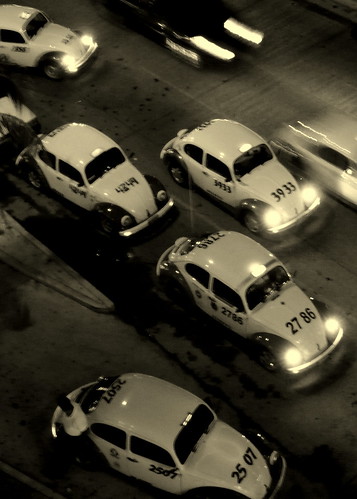The sun slowly disappeared over the hills surrounding the bay of Acapulco and the water was now freezing. My friend Carlos agreed it was time to get out. In the elevator on the way down to let me out of his apartment building (the pool's on the roof) I noticed in the mirror that my eyes were excruciatingly bloodshot, as if they had just been rubbed with a handful of sand. Carlos saw me off and my tummy began to rumble urging me to stop in a restaurant for a bite to eat. I slipped into a nearby Subway on the Costera and quickly noticed I was the only one without cubrebocas (face masks), including the employees. Not only did I look like the walking dead, but I could feel the "tickly sensation" of an oncoming sneeze. Immediately I released two mists of saliva into the palms of my hands. "Do you need a cubrebocas?" the employee asked. Behind his "face condom" I couldn't tell if he was joking or legitimately concerned.
Unlike the clientele and workers in the restaurant may have believed, I didn't have the dreaded swine flu; a combination of bad allergies and my eye contacts had caused the inflammation. But who could blame them for their suspicions fed by the exaggerated climate of an incessant media and quick-acting government. Here in Acapulco, within days of the outbreak and at the hest of the Health Department, cinemas and malls were closed, restaurants were ordered to serve only take-out, all classes were canceled for two weeks in some places, up to three in others, and all of it giving the idea that this was an extremely contagious deadly disease.
I admittedly fell into the trap constantly checking the news online for anything swine-flu related and readily sent it to the other Mexico Fulbright assistants. The WHO raised their "warning" level to the very scary-sounding phase 5-6, Widespread Human Infection, while the media relentlessly counted and reported both confirmed and unconfirmed cases. Then there were the constant images of cubrebocas in newspapers, TV and on the internet, although I could just take a glance out my window to see people walking down the street in them. Family members understandingly fearing for my safety also helped fan the flame. One of my aunts wrote me an email pleading that I return home. Even my dad, who's usually the rational one, sent me an email urging me to consider ending the Fulbright program early to go back to tha U.S. I started to think, "Ruh-roh! This must be serious!"
But I began to wonder, "If it really were that dangerous the State Department would have evacuated us already...right?" That is unless Obama really was plotting to take over PEMEX and distract the Mexican public by infecting them with pork influenza like one of the conspiracy theories I had heard.
I had been planning a 14-hour bus trip to Guadalajara but then I chickened out since I had to pass through-- gulp -- "ground zero," Mexico City! However, I started to think about it; Acapulco is the number one tourist destination for Chilangos (those who live in the capital). It could indeed be safer to travel at this time than to stay put in this popular vacation spot. As I headed out of my house with my duffle bag, the landlady was picking mangos from the branches above the carport. I explained to her where I was going, which was met with a dramatic pause. "Cuídate mucho (Take care of yourself)," she said almost as if it were a final goodbye.
Of course I made it to my friend's house in Guadalajara alive and ended up spending a week there because the Health Secretary in the state where I live, Guerrero, decided to push back classes. I was happy for the extended vacation, although with bars and clubs closed there wasn't that much to do at night, except grab my friend's wig and make a low-end remake of Beyonce's "I'm a Diva" video.
At the beginning, it kind of sounded like the plot from Outbreak, but now seems just blown out of proportion, and I'm still left a bit confused as to how serious the threat is. Mexico's Minister of Health claims to have avoided 8,000 potential deaths with their measures; a total of 66 deaths have been reported. This is hardly the killer Flu of the early 1900's and more than a hundred times more people have been killed by the drug war, but the swine-flu fiasco unfortunately has probably done an equal amount of damage to Mexico's image abroad. Cubrebocas may filter out the virus but it can't filter out the hype.


